Nigel Farage, the leader of the right-wing populist party Reform UK, has been making more claims regarding migrants and migration policy, outlining what he would do should his party ever win the elections. But how realistic and doable are they? And how many people would they affect if they were implemented?
Reform UK claims that "uncontrolled immigration has pushed Britain to breaking point." It says that if it were allowed to "secure Britain’s borders," it could "protect wages, our public services and British culture and values."
This week, the party announced it intends to scrap indefinite leave to remain for migrants, among other policies it said would "prioritize UK citizens," if it were to be elected to power.
The party has also promised it would make migrants reapply for their visa every five years and would stop anyone other than British citizens from accessing welfare benefits.
Overall, the party claims that it could save the British public 234 billion pounds (about 267 billion euros) over the next "several decades."
InfoMigrants takes a closer look at the party's claims and how realistic they are.
Read AlsoAsylum seekers in the UK scapegoated amid economic precarity
What are the claims?
In a paper published last year for the general election, Reform UK says they are aiming for "smart immigration, not mass immigration." They say that "all non-essential immigration" would be "frozen to protect public services, boost wages, end the housing crisis and cut crime."
Tackling migration -- what Reform UK is promising:
- Channel crossings: The party promises to "detain and deport" all those who arrive in the UK via small boat, and "if needed, migrants in small boats will be picked up and taken back to France."
- A "four-point plan" to stop boats from crossing the Channel. This would include leaving the European Convention on Human Rights, forbidding the possibility for "illegal immigrants to be resettled in the UK." It would also create a "new department for immigration," and pick up "illegal migrants out of boats and take them back to France."
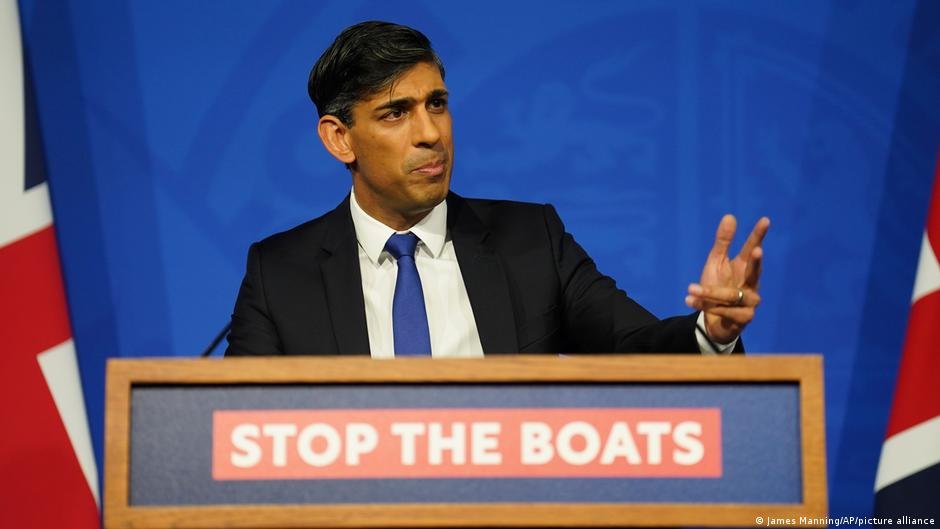
- Asylum process: "All asylum seekers that arrive illegally from safe countries will be processed rapidly, offshore if necessary." Furthermore, Reform UK says that "Those entering from a safe country will also be barred from claiming asylum or citizenship."
- There would be "no legal aid for non-citizens," and "those rejected will be returned."
- Dealing with criminals: Reform UK says that any "foreign criminals" would be "immediately deported, after their prison sentence ends" and proposes to "withdraw citizenship from immigrants who commit a crime with the exception of some misdemeanor offenses."
- Residency: Student dependents, so dependents of those on a student visa in the UK, would be "barred."
- A "five-year residency and employment" hurdle to anyone wishing to claim benefits in the UK.
- An "immigration tax", making the national insurance rate (the current tax paid by all UK employees towards their healthcare and pension) 20 percent of their earnings for all foreign workers. This, claims Reform, "would incentivize business to employ British citizens whose National Insurance rates would stay at 13.8 percent." Only those regarded as "essential" (for instance healthcare workers) would be exempt from the tax. According to Reform, these measures could raise "more than 20 billion over five years" that would then be used to "pay for the apprenticeships and training for young Brits."
All in all, Reform claimed that these proposals would help save the UK between five and ten billion pounds (between 5.7 and 11 billion euros) per year.
Read AlsoUK: Is there an increasing number of sexual assaults committed by male migrants?
Abolishing ILR
Reform UK this week also announced the party intends to abolish indefinite leave to remain (ILR). Farage claimed this would make sure that those who were allowed to stay in the UK for the duration of their visas were contributing to the British economy, as having to reapply for a visa every five years would ensure they fulfilled hurdles like being in full employment, having a high standard of English and earning above a certain salary threshold in order to qualify for their visas.
ILR, said Farage, also gave people an automatic right to benefits and conferred upon people all the rights enjoyed by other British citizens. Something he wants to be harder to come by.
Farage told reporters that he believed that Britain should not be "the world’s food bank," and "it is not for us to provide welfare for people coming in from all over the world."

How realistic and implementable are these claims?
Many of the policies outlined by Farage would require law changes and treaty changes to rescind rights and status already granted, in some cases, to hundreds of thousands of people.
His costings and potential savings have also been called into question by experts and politicians.
Returning people to France, or removing them from boats mid-voyage would currently be impossible under international maritime law and conventions, not to mention, it is unlikely that the French would accept such a proposal. The current Anglo-French accord allows for a 'one in, one out' policy. So far, four migrants have been sent back to France under the pilot scheme and the French authorities admitted to the French news agency Agence France Presse (AFP) this week that finding eligible migrants to send to the UK is proving difficult.
The first three migrants from France were sent to the UK this week.
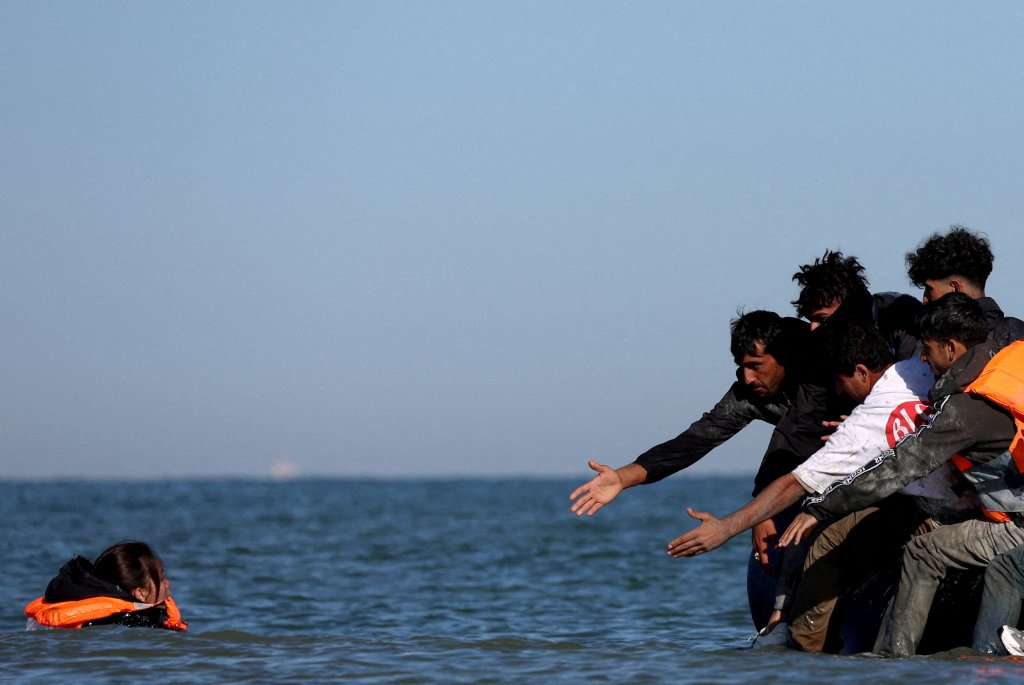
Processing migrants offshore has so far proved impossible to do. The Conservative government's Rwanda plan failed, after costing billions and was scrapped by the current Labour government. Italy's attempt to process asylum seekers in Albania has also not proved to be the success anticipated by the Italian government. Most attempts run into legal challenges, even though the EU and even the current British government have expressed interest in finding "third country" solutions to dealing with asylum claims.
Leaving the European Convention on Human Rights (ECHR) would be complicated and could have far-reaching consequences, placing the UK apart from most other Western countries, which could affect its international standing, as well as day-to-day legislation and case law.
According to the UK in a Changing Europe, an academic think tank providing impartial research-based analysis of the UK’s relationship with the EU and hosted by King’s College in London, "if the UK withdrew from the ECHR there would be inevitable international consequences."
These would range from affecting the Belfast/Good Friday agreement, which brought a peace settlement to Northern Ireland after years of violence, killing and deaths. It would also further strain relations with the EU and could affect the UK-EU trade and cooperation agreement, the think tank points out in a report published in May 2024.
"Experts also agree that withdrawal would be at odds with the UK’s integrated review of security, defense, development and foreign policy," all things that are based on the UK’s commitment to international law and universal human rights.
Leaving the ECHR would also affect law in the UK, since the British Human Rights Act (passed in 1998) is based on the rights enshrined in the ECHR. So, in order to leave the ECHR, the government would also have to repeal the HRA, which would require the government to pass another act to replace it. And that would also require parliamentary approval.
Being a signatory to the ECHR is a condition for membership in the Council of Europe. So, if the UK were to leave the ECHR, it would also have to leave the Council of Europe, the report authors state. Both steps would involve legislative changes at the international and domestic levels.
Formal notification of the intention to withdraw from the ECHR would take six months. On the domestic level, the government would need the approval of parliament.
Read AlsoUK and France seek novel way to stop small boats amid new records
Are legislative changes possible?
Passing bills in the UK can take months if not years. Some don’t pass within a full parliamentary term, since they require not only majorities to vote for them, but also a series of debates in both parliamentary houses and with all MPs and lords involved, of all political persuasions. Bills are subject to rounds of modifications and more votes before they finally make their way to seek royal assent and are passed into law.
However, even when a bill passes the lower house of parliament, the upper House of Lords can order more modifications before sending it back to the lower house for another round of votes that often result in some of the more extreme policies being modified quite heavily.
Only governments with very strong majorities are able to pass legislation slightly more quickly, as if all MPs in the ruling party or coalition agree, then there might be fewer modifications.
The UK electoral system, which operates a first-past-the-post electoral system, has favored the two main parties (Labour and Conservative) up until now. Even in the 2024 election, where Reform came second in terms of the number of votes in many constituencies, they didn't gain many actual seats. They currently hold five in the UK parliament. This is compared to Labour's 399.
Past experience also shows that previous attempts to introduce an alternative Bill of Rights floundered in parliament. In June 2022, the then Conservative Minister of Justice Dominic Raab attempted to introduce a Bill of Rights that he hoped would make it harder for people to bring claims via the ECHR. Even though the UK clarified it did not at that point intend to leave the ECHR, the bill failed to progress through parliament.
Read AlsoUK riots: How far-right actors capitalized on public anger
'No basis in reality'
Britain’s current Chancellor (Finance Minister), Rachel Reeves, declared that Farage’s claims "have no basis in reality," and that the UK government is already looking at restricting migrants' welfare access. The British government is also, according to the BBC, already consulting on whether or not to double the average wait for migrants applying for ILR from the current five years to ten.
The Labour government has also noted that some of the financial figures used by Farage came from a report authored by the Centre for Policy Studies (CPS), a think tank founded by former Conservative Prime Minister Margaret Thatcher.
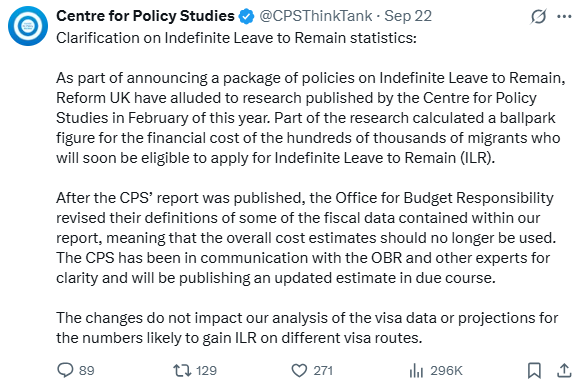
The figures used in that report were later challenged by the Office for Budget Responsibility, a watchdog set up to assess and calculate government budgets and later the CPS admitted that these figures "should no longer be used."
'Half-baked and unworkable'
Ben Chu, a correspondent with the BBC’s Verify department, told viewers that he would be "very very wary" of the figures claimed by Farage. Firstly because the CPS had withdrawn their own figures and said that they would put out another set later, but haven’t yet, and secondly because it is very difficult to estimate exactly how many people might be affected by a policy, how much they might or might not contribute to, or cost, the UK economy, or even whether withdrawing a right, might end up costing the country more than allowing for those with ILR to continue with their current status.
Chu also points out that the estimates were not for any given year, but for how much people who might get ILR might cost the British taxpayer over "their lifetime" which is "difficult to estimate." Chu explained on BBC’s Newscast, "Speaking to labor market experts who are looking at how that estimate was arrived at, and the actual numbers of what recent migrants to the UK are earning, and could reasonably be expected to continue earning, over their lifetimes, they don’t think it’s a credible figure."
Reeves told the BBC "the numbers that Reform have come out with overnight have already begun to disassemble."
The Conservative Party's shadow Home Secretary Chris Philp also branded Reform’s plans "half-baked and unworkable."
Philp told the BBC that he believed Reform are "a one-man band with no experience of government, and their reckless, left-wing economics mean more debt, more spending, more tax."
The Liberal Democrats also said that Reform’s proposals were "not serious." Liberal Democrat leader Ed Davey spent much of his party conference speech picking apart why it would be dangerous to allow Reform into power. Reform are currently ahead in the polls, were there to be an election held right now.
How many people might Reform’s policies affect?
Reform claims that the changes would lead to "hundreds of thousands of people having to apply and ultimately losing their settled status in the UK."
Head of Policy for Reform, Zia Yusuf, said the party believed that "many of those who will lose their leave to remain are entirely dependent on the welfare state and will leave voluntarily upon losing access to benefits."
Those who don’t leave, Yusuf promised, "would be subject to immigration enforcement as part of our mass deportation program."
The exact number of people who might be affected is difficult to quantify, since it is based on people who might potentially apply for ILR in the future, and not all migrants might stay long enough, or want to apply for that.
However, data obtained from the Home Office by the BBC demonstrates that there has been a gradual increase in the number of people granted ILR in the UK over the last decade.
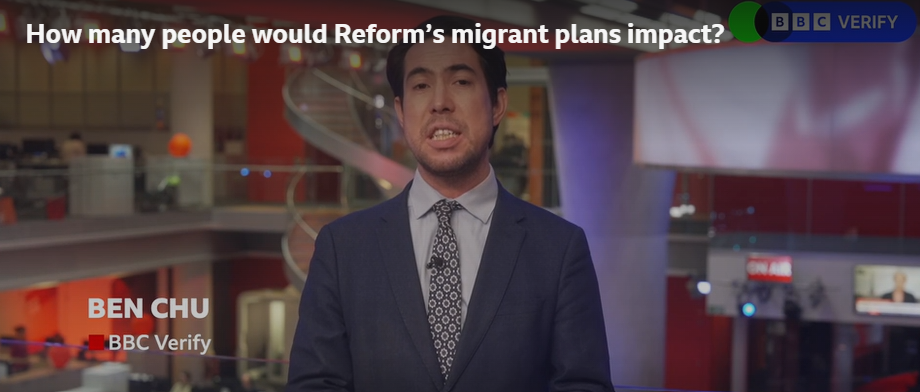
At the end of 2024, estimates from the Migration Observatory at the University of Oxford showed that the total population of non-EU citizens with ILR stood at 430,000. These people, under Reform’s plans, could be the ones targeted to lose their ILR status and be forced to apply for visas.
Reform has said that EU nationals granted ILR under the European Union Withdrawal Agreement (whereby EU citizens who had been living and working in the UK could apply for settled status there), who number around four million, would not lose their status under their policy proposals. However, EU nationals not benefiting from those provisions, reported the BBC, would be subject to the new system.
In July this year, the Department for Work and Pensions published figures suggesting that 213,666 people with ILR were claiming Universal Credit (welfare) benefits. According to the BBC, EU nationals with protection, who are not being targeted by Farage’s policies, actually make up the "majority of benefit claimants by people with ILR."
According to Ben Chu of BBC Verify, "in the year ending June 2025, there were 163,000 grants of ILR to non-EU citizens." As for those who might go on to claim ILR in the future, at the end of 2024, Chu reports that there were around four million people in the UK on temporary visas. These people arrived between 2015 and 2024.
Experts at the Migration Observatory, reported Chu, believe that just over half of those four million (2.1 million) could claim a potential path to settlement. Although Chu says it is really difficult to quantify how many people it might affect, Farage’s proposals could end up splitting families and affecting a "very very large number of people currently residing in the UK."
Despite other parties' quick dismissal of his policies, Farage claims that his proposals will force the other parties to take note and adopt some of his policies to regain popularity among the British electorate.
Read AlsoWhy immigration is a major issue in the UK election
Current policies to reduce migration
The Labour government says that it is already pursuing policies to reduce migration and "bring down illegal migration." Chancellor Rachel Reeves told the BBC that her government has "sent a record number of people who have no right to be in our country home. We’re reducing the use of hotels for asylum seekers and we’ve made an agreement with France to send people back who come over on small boats."
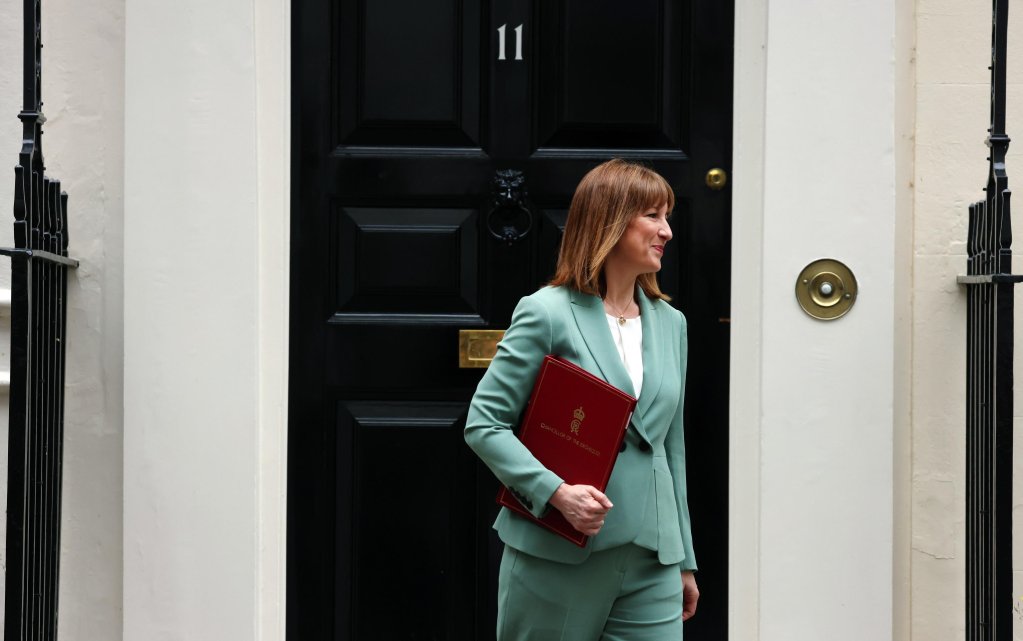
Reeves added that "those are all steps towards our ambitions to get a grip of this situation that we inherited."
Information provided to InfoMigrants by the Home Office this week underlines that the current Home Secretary, Shabana Mahmood, introduced a bill in parliament, when she was still Minister for Justice, that would allow for "immediate deportations" of foreign criminals, and would obviate the need for them to serve any of their sentence before being deported.
The government also introduced secondary legislation that came into effect on September 23, which allows for the deportation of prisoners with no right to be in the country once they have served 30 percent of their sentence. Currently, they can be deported after serving 50 percent of their allotted time in jail.
The Home Office underlines that since taking office on July 5, 2024, they have deported 5,179 foreign national offenders, which marks a 14 percent increase compared to the 4,532 returns operated in the last year of the Conservative government’s rule.
